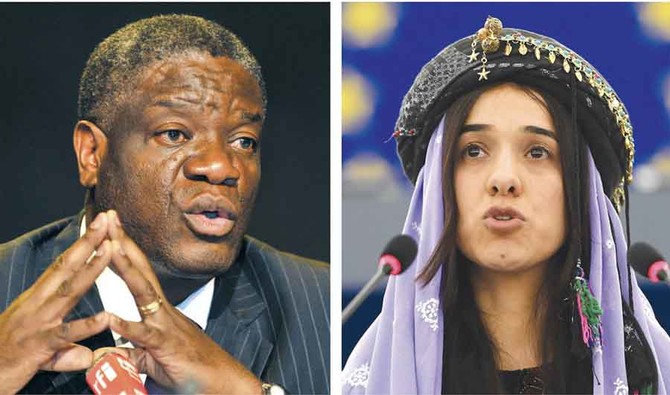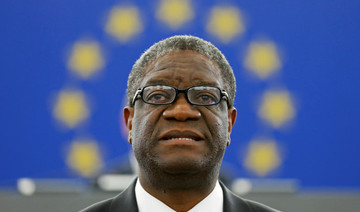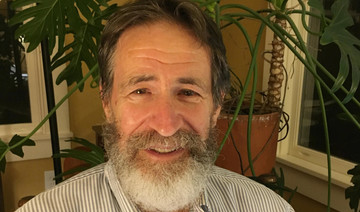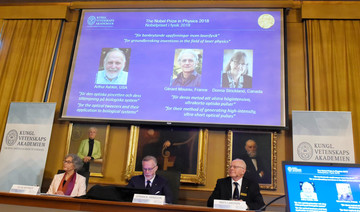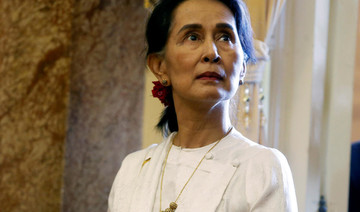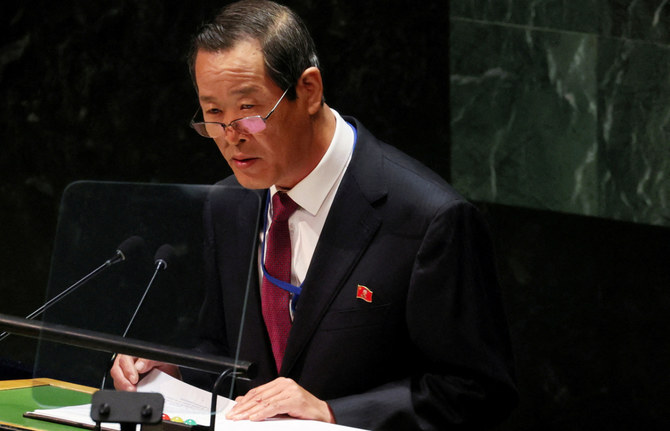LONDON: The list of 331 nominees had included the German Chancellor Angela Merkel, the White Helmets of Syria, the Russian newspaper Novaya Gazeta, North Korea’s leader Kim Jong Un and his South Korean counterpart Moon Jae-in.
But in the end, the Nobel Peace Prize for 2018 was awarded to a 25-year-old woman and a 63-year-old doctor who had witnessed sexual violence being used as a weapon of war.
Nadia Murad, an Iraqi Yazidi, was captured, raped, tortured and sold into sex slavery by Daesh in 2014. She escaped and became an outspoken and articulate campaigner for victims of sexual violence in war.
Gynaecologist Dr. Denis Mukwege founded a hospital in his native Democratic Republic of Congo (DRC) where he pioneered surgery to treat tens of thousands of women for injuries resulting from rape during the country’s two recent wars.
Announcing the award in Oslo, the Norwegian Nobel Committee said the two were chosen “for their efforts to end the use of sexual violence as a weapon of war and armed conflict. They have both put their own personal security at risk by courageously combatting war crimes and securing justice for victims.”
On learning the news, Murad said: “I share this award with all Yazidis, with all the Iraqis, Kurds and all the minorities and survivors of sexual violence around the world. As a survivor I am grateful for this opportunity to draw international attention to the plight of the Yazidi people who have suffered unimaginable crimes since the genocide by Daesh.”
Praise poured in from all over the world for the two newest Nobel Peace Prize laureates.
The Iraqi government tweeted congratulations and “our deepest respect” to Murad, pledging a renewed commitment to supporting the victims of sexual violence perpetrated by Daesh and to “delivering meaningful justice to survivors.”
Jan Egeland, Secretary General of the Norwegian Refugee Council, a humanitarian organization that has worked extensively in the Middle East, tweeted: “The best Nobel Prize in a long time. Finally focus on horrific and widespread sexual violence in war.”
Kenneth Roth, executive director, of Human Rights Watch described the award as “well deserved and long-awaited.”
At 25, Murad is the second-youngest Peace Prize recipient, after Pakistani Malala Yousafzai, who was 17 when she received hers, and was among the first to congratulate Murad.
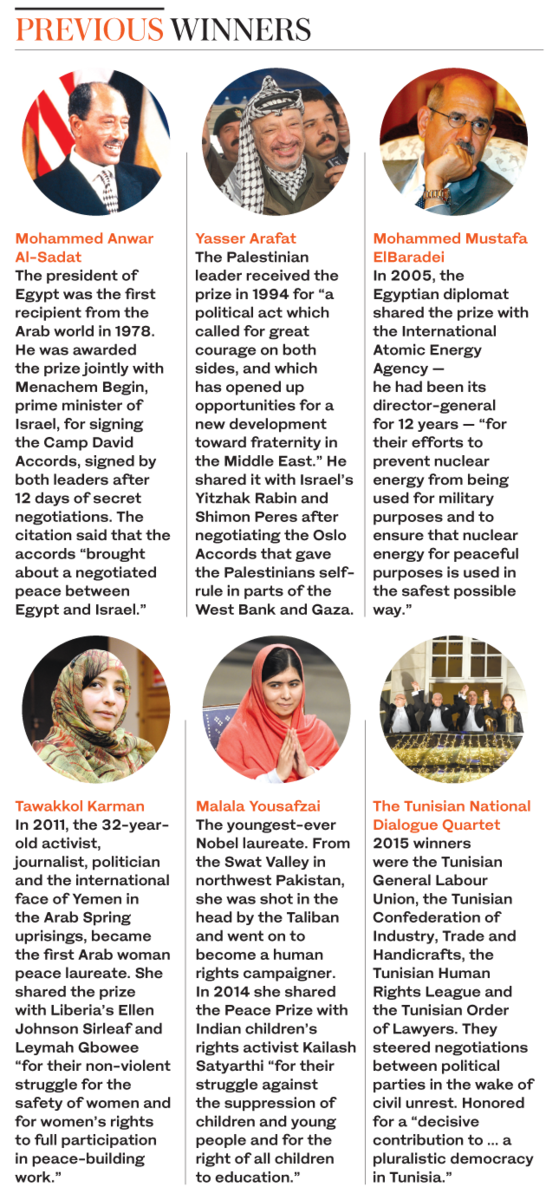
Donald Tusk, president of the European Council, said that both Murad and Dr. Mukwege “have my deepest respect for the courage, compassion and humanity they demonstrate in their daily fight.”
Murad, the daughter of a Yazidi farmer, was 19 when Daesh descended on her village in Sinjar, northern Iraq, on August 3, 2014. They rounded up the Yazidis, killing 600, including six of her brothers. Murad was one of more than 6,700 Yazidi women enslaved by Daesh in Iraq. She was taken to Mosul where she was repeatedly beaten and raped.
After three months she managed to escape when her captor left the house unlocked one day. A neighboring family helped to smuggle her out of Daesh-controlled territory and she reached a refugee camp in Duhok, northern Iraq.
The day after her arrival, she spoke to a BBC journalist. She was offered anonymity but declined, saying: “No, let the world see what happened to us.”
She embarked on a mission to expose the horror of what Daesh call “sexual jihad” and to seek justice for all the victims who had become the spoils of war.
In December 2015, she gave the United Nations Security Council its first briefing on human trafficking. When during the following year the Council of Europe awarded her the Vaclav Havel Human Rights Prize, she used her acceptance speech to call for an international court to judge crimes committed by Daesh. She has also launched a lawsuit against Daesh commanders.
The UN named her goodwill ambassador for survivors of trafficking. Two years ago she launched Nadia’s Initiative to provide advocacy and assistance to victims of genocide, atrocities and trafficking.
She now lives in Germany but continues to receive threats.
Dr. Mukwege also lives under threat. He escaped an assassination attempt in 2012, in which his daughters were held hostage and his bodyguard was shot dead.
As a young doctor he witnessed the damage suffered by women who received no proper care when giving birth. He founded the Panzi Hospital in Bukavu, eastern DRC, where he noticed that most of his patients came from conflict zones and had been raped and sexually mutilated.
“These weren’t just violent acts of war but part of a strategy,” he said. “You had situations where multiple people were raped at the same time, publicly — a whole village might be raped during the night. In doing this, they hurt not just the vitiates but the whole community which they forced to watch. The result of this strategy is that people are forced to flee their villages abandon their fields, their resources, everything. It’s very effective.”
He developed reconstructive surgical procedures and with his team has helped more than 85,000 women. Skills training, so that women can support themselves, and legal advice are part of the hospital’s after care.
In a speech to the UN in September 2012, he criticized the DRC government for failing to tackle impunity for mass rape. A month later, he was held at gunpoint outside his home but miraculously escaped.
In acknowledging the doctor’s award, Congolese government spokesman Lambert Mende paid somewhat grudging tribute: “We have not always been in agreement but we salute that a compatriot is recognized.”
The Nobel Peace Prize was established by Swedish industrialist and inventor Alfred Nobel. Nominations are invited from governments, members of legal institutions, university professors and members of and advisers to the Norwegian Nobel Institute and must be submitted to the five-member Norwegian Nobel Committee.
Prize winners receive a diploma, a medal and nine million Swedish kronor (nearly $1 million).
The Peace Prize has proved to be contentious over the years since it was first awarded in 1901 to Henry Dunant, the founder of the Red Cross. Some have accused the Nobel committee of political manipulation in awarding the prize in hope of encouraging future achievement rather than recognizing past accomplishments.
When Barack Obama won in 2009, many felt he had done little to deserve it after only ten months in the White House. In his memoirs published six years later, Geir Lundestad, the former secretary of the Nobel committee, admitted: “Even many of Obama’s supporters believed the prize was a mistake. In that sense the committee didn’t achieve what it had hoped.”
There was similar bemusement when the entire European Union was awarded the prize in 2012.
Myanmar leader Aung San Suu Kyi won the prize in 1991 but has since become such a divisive figure that there are calls for it to be rescinded.
The Peace Prize is not awarded at all if the committee decides there is “no suitable living candidate,” as in 1948, the year Mahatma Gandhi was assassinated. He was a nominee that year and also in 1937, 1938, 1939 and 1947 but never won.
There is unlikely to be much dissent in Oslo on December 10 when a young woman from a village in northern Iraq and a doctor from rural Congo step up to the podium.


